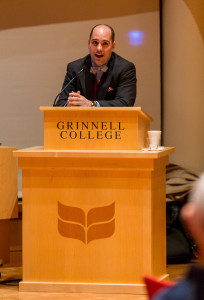
Emma Friedlander
friedlander@grinnell.edu
Last Monday, Nov. 30, Grinnell College hosted Matthew Hughey, Assistant Professor of Sociology at the University of Connecticut, who gave a talk, “A Level Playing Field? Zombie Theories of Athletics, Genetics, and Race in Mainstream Global Media,” addressing the persistent misconception that racial genetics influence athletic performance. Hughey insisted that this notion is perpetuated by the false idea that race is biological and that biology is more influential than sociological factors. Hughey explained his argument by means of a zombie allegory, which he threaded throughout the talk.
“I speak of zombies here tonight because I think the concept works as a fitting metaphor for the discussion of racial essentialism and biological determinism,” Hughey explained. “The intertwining and interwoven notion of racial essentialism and biological determinism is what I call ‘the zombie theory.’ I call it so for two reasons. First, the theory is hard to kill. It just doesn’t go away. Second, the theory consumes our brains. That is, it makes us really stupid.”
Hughey analyzed recent Western media, especially sports journalism, for evidence of propagating the idea that biological race influences athletic performance. He collected this data by performing content analysis of major American media sources, searching for congruency of search terms from three major groups: 1) Black, African, ethnicity, Jamaican 2) athlete, sports, sprinting, football, basketball 3) biology, genetic. Limiting his search to articles from January 2003 to June 2014, Hughey uncovered 292 unique newspaper articles that promote these ideas.
“The most prominent pattern of the global media discussion was of racial essentialism: the idea that race exists biologically,” Hughey said of his findings. “First, journalists say, race has real, defined genetic patterns. Second, journalists tell us that harsh conditions and the culling of weaker genes from the gene pool lead to ‘natural selection.’ Finally, journalists insist that their findings are objective and removed from political agenda.”
These racist ideas have permeated the field of sports writing in a variety of ways. Journalists propose that Black athletes have an advantage because of fast-twitch muscle genes, or the symmetry of their knees. Others claim that certain races, ranging from Pacific Islanders to Western Africans, perform better in certain sports because they have more testosterone.
Moreover, journalists also suggest that the high performance of Black athletes is due to natural selection. The transatlantic slave trade, they say, ensured that only the fittest specimens remained in the gene pool. Hughey said that this supposed science is bogus.
“It only makes sense if you don’t think about it,” Hughey said. “Many who search for a biological explanation to the decidedly social arena of football or basketball or sprinting are simply asking the wrong sort of question. Our contemporary moment of Black dominance in sprinting, for example, can be explained largely by social and cultural reasons.”
Hughey went on to use various historical and contemporary examples to prove why these genetic ideas about race are long disproven and decidedly racist. Ideas about natural selection as they pertain to certain ethnic groups’ athletic performance have existed for centuries, shifting as different groups, be they Black or Irish or Italian or Jewish, have been both subjugated by western society and simultaneously achieved athletic success. Moreover, by comparing rhetoric from the nineteenth century to now, Hughey demonstrated that these racist ideas are no different than they were two hundred years ago, disproving the idea that we live in a post-racial world.
“I believe the study reveals an inordinate amount of mainstream media attention on the belief that racially unequal sporting outcomes are biologically derived,” Hughey concluded. “When race is not realized as a social construct, it is coupled with outmoded beliefs and assumptions about natural selection and the primordial construction of African bodies. It promotes a seductive and easy explanation for contemporary Black success in the field. With these assumptions, the causal mechanism of racial difference is simply hidden away in the genes. Any social responsibility for inequality is absolved.”
Audience member Kayla Estes ’18 appreciated Hughey’s emphasis on biased science.
“As a student in the sciences, I feel like we talk about biased science for only one class period, but it’s a much bigger thing,” Estes said. “That’s one thing I think Grinnell could work on more. It’s a bigger issue than can be covered in one class period.
The event was co-sponsored by the Office of Diversity and Inclusion; the Center for Humanities; the Rosenfield Program; the Instructional Support Committee; the Gender, Women’s, and Sexuality Studies Department; the Department of Sociology and the Department of Anthropology. Professor Kathleen Oberlin, Sociology, organized and moderated the event.



















































